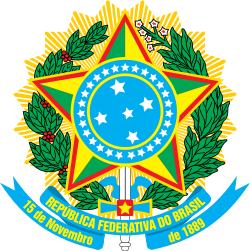2010 Brazilian legislative election
The 2010 Brazilian legislative election was held on Sunday, October 3, as part of the country's general election. On that date, 54 of the 81 seats in the Federal Senate and all 513 seats in the Chamber of Deputies were up for election.
| |||||||||||||||||||||||||||||||||||||||||||||||||||||||||||||||||||||||||||||||||||||||||||||||||||||||||||||||||||||||||||||||||||||||||||||||||||||||||||||||||||||||||||||||||||||||||||||||
513 seats in the Chamber of Deputies 2⁄3 (54 seats) of the Senate | |||||||||||||||||||||||||||||||||||||||||||||||||||||||||||||||||||||||||||||||||||||||||||||||||||||||||||||||||||||||||||||||||||||||||||||||||||||||||||||||||||||||||||||||||||||||||||||||
|---|---|---|---|---|---|---|---|---|---|---|---|---|---|---|---|---|---|---|---|---|---|---|---|---|---|---|---|---|---|---|---|---|---|---|---|---|---|---|---|---|---|---|---|---|---|---|---|---|---|---|---|---|---|---|---|---|---|---|---|---|---|---|---|---|---|---|---|---|---|---|---|---|---|---|---|---|---|---|---|---|---|---|---|---|---|---|---|---|---|---|---|---|---|---|---|---|---|---|---|---|---|---|---|---|---|---|---|---|---|---|---|---|---|---|---|---|---|---|---|---|---|---|---|---|---|---|---|---|---|---|---|---|---|---|---|---|---|---|---|---|---|---|---|---|---|---|---|---|---|---|---|---|---|---|---|---|---|---|---|---|---|---|---|---|---|---|---|---|---|---|---|---|---|---|---|---|---|---|---|---|---|---|---|---|---|---|---|---|---|---|---|
This lists parties that won seats. See the complete results below. | |||||||||||||||||||||||||||||||||||||||||||||||||||||||||||||||||||||||||||||||||||||||||||||||||||||||||||||||||||||||||||||||||||||||||||||||||||||||||||||||||||||||||||||||||||||||||||||||
 |
|---|
| This article is part of a series on the politics and government of Brazil |
|
|
|
Administrative divisions
|
|
|
This election was marked by the advance of the Lulista bloc, gathered around the For Brazil to keep on changing coalition, in the National Congress. On the other hand, the centre-right opposition, gathered around the Brazil can do more coalition, lost seats in both houses.
Election information
According to the Constitution, each state is represented by three Senators elected by a majority of the votes. They are directly elected to an eight-year term, and there is no limit on the number of terms a Senator may serve. Alternating, one third and then two thirds of the seats are up for election every four years. In 2006, one third of the seats were up for election and thus in 2010 two thirds of the seats were up for election, corresponding to two of the Senators elected by each one of the 26 Brazilian states and the Federal District.
The Chamber of Deputies represent the people of each state, and its members are elected by a system of proportional representation, due to federalism being adopted as the form of government in the country. Federal deputies are elected for a four-year term, and there is no limit on the number of terms a deputy may serve.
Election results

In 2010, 22 of the country's 27 registered political parties were able to elect at least one representative in the Chamber, while 15 were able to elect at least one Senator.
As a result of the so-called "Red Wave",[1] the Workers' Party (PT) became the largest party in the Chamber for the first time ever with 88 deputies, and elected Marco Maia as President of the lower house.[2] Collectively, its coalition, For Brazil to keep on changing, elected 311 deputies.[3] Four parties in the coalition lost seats; the Brazilian Democratic Movement Party (PMDB), Brazilian Republican Party (PRB), Democratic Labour Party (PDT), and the Christian Labour Party (PTC). However, only the PTC failed to gain seats in either house. The Republic Party (RP) had the biggest gain, electing 16 deputies more than in 2006.[3] In the Senate, the centre-left coalition was able to elect 39 seats, against 10 won by the opposition.[4] PT reached an all-time high in the upper house, electing 12 Senators and becoming the second largest party in the Senate, behind only the PMDB.[4] The other parties in the coalition did not have any significant gains, with the exception being the Communist Party of Brazil (PCdoB), which was able to elect the first female Communist Senator in Brazilian history (Vanessa Grazziotin, from Amazonas).[5]
The anti-Lula bloc, on the other hand, suffered substantial losses in both houses. The Democrats (DEM), which had been the second largest party in the Senate during the previous 2007-2011 legislature, was the fourth largest, and managed to elect only 2 seats, reducing their total to 6 seats, tied with the Brazilian Labour Party (PTB) from the same coalition.[4] It also had the largest loss in the Chamber, losing 22 seats, and was closely followed by its ally, the Brazilian Social Democratic Party (PSDB), which lost 13 seats.[3] Overall, the Brazil can do more coalition lost control of 44 seats in the Chamber[3] and 11 in the Senate.[4] Influential members of the opposition during the Lula administration, such as Arthur Virgílio, Heráclito Fortes, Marco Maciel, and Tasso Jereissati, were not able to obtain re-election and will no longer serve in the National Congress.[6]
Other opposition members were more successful than the centre-right Brazil can do more coalition. The Socialism and Liberty Party (PSOL) was able to elect two Senators, gaining an extra seat when compared to the previous legislature.[4] It also kept its three seats in the Chamber.[3] The Green Party (PV) gained two extra seats in the Chamber,[3] in spite of losing its only seat in the Senate.[4]
By party
Summary of the 3 October 2010 National Congress election results
| Coalition | Parties | Chamber | Senate | ||||||||||
|---|---|---|---|---|---|---|---|---|---|---|---|---|---|
| Votes | % of votes | Seats | % of seats | +/– | Votes | % of votes | Elected seats | Total seats | % of seats | +/– | |||
| Lulista For Brazil to keep on changing |
Worker's Party (Partido dos Trabalhadores, PT) | 16,289,199 | 16.9 | 88 | 17.1 | +5 | 39,410,141 | 23.1 | 11 | 15 | 17.3 | +7 | |
| Brazilian Democratic Movement Party (Partido do Movimento Democrático Brasileiro, PMDB) | 12,537,252 | 13.0 | 79 | 15.3 | –10 | 23,998,949 | 14.1 | 16 | 19 | 24.6 | +3 | ||
| Republic Party (Partido da República, PR) | 7,311,655 | 7.6 | 41 | 7.9 | +16 | 4,649,024 | 2.7 | 3 | 4 | 4.9 | — | ||
| Brazilian Socialist Party (Partido Socialista Brasileiro, PSB) | 6,851,053 | 7.1 | 34 | 6.6 | +7 | 6,129,463 | 3.6 | 3 | 3 | 3.7 | — | ||
| Democratic Labour Party (Partido Democrático Trabalhista, PDT) | 4,854,602 | 5.0 | 28 | 5.4 | +4 | 2,431,940 | 1.4 | 2 | 4 | 4.9 | –2 | ||
| Social Christian Party (Partido Social Cristão, PSC) | 3,072,546 | 3.2 | 17 | 3.3 | +8 | 1,247,157 | 0.7 | 1 | 1 | 1.2 | — | ||
| Communist Party of Brazil (Partido Comunista do Brasil, PCdoB) | 2,748,290 | 2.8 | 15 | 2.9 | +2 | 12,561,716 | 7.4 | 1 | 2 | 2.4 | +1 | ||
| Brazilian Republican Party (Partido Republicano Brasileiro, PRB) | 1,633,500 | 1.7 | 8 | 1.5 | +7 | 3,332,886 | 2.0 | 1 | 1 | 1.2 | –1 | ||
| Christian Labour Party (Partido Trabalhista Cristão, PTC) | 595,431 | 0.6 | 1 | 0.1 | –2 | 282,629 | 0.2 | 0 | 0 | 0.0 | — | ||
| National Labor Party (Partido Trabalhista Nacional, PTN) | 182,926 | 0.2 | 0 | 0.0 | — | 6,013 | 0.0 | 0 | 0 | 0.0 | — | ||
| Total | 56,076,454 | 58.1 | 311 | 60.6 | +37 | 94,049,918 | 55.2 | 39 | 49 | 61.7 | +8 | ||
| Opposition Brazil can do more |
Brazilian Social Democratic Party (Partido da Social Democracia Brasileira, PSDB) | 11,477,380 | 11.9 | 53 | 10.3 | –13 | 30,903,736 | 18.1 | 5 | 11 | 13.5 | –5 | |
| Democrats (Democratas, DEM) | 7,301,171 | 7.6 | 43 | 8.3 | –22 | 10,225,883 | 6.0 | 2 | 6 | 7.4 | –7 | ||
| Brazilian Labour Party (Partido Trabalhista Brasileiro, PTB) | 4,038,239 | 4.2 | 21 | 4.0 | –2 | 7,999,589 | 4.7 | 1 | 6 | 7.4 | –1 | ||
| Socialist People's Party (Partido Popular Socialista, PPS) | 2,536,809 | 2.6 | 12 | 2.3 | –10 | 6,766,517 | 4.0 | 1 | 1 | 1.2 | +1 | ||
| Party of National Mobilization (Partido da Mobilização Nacional, PMN) | 1,086,705 | 1.1 | 4 | 0.7 | +1 | 241,321 | 0.1 | 1 | 1 | 1.2 | +1 | ||
| Labour Party of Brazil (Partido Trabalhista do Brasil, PTdoB) | 642,422 | 0.7 | 3 | 0.5 | +2 | 1,480,846 | 0.9 | 0 | 0 | 0.0 | — | ||
| Total | 27,082,726 | 28.0 | 136 | 26.5 | –44 | 57,617,892 | 33.8 | 10 | 25 | 30.8 | –11 | ||
| Lulista Out of coalition |
Progressive Party (Partido Progressista, PP) | 6,330,062 | 6.6 | 41 | 7.9 | — | 9,170,015 | 5.4 | 3 | 4 | 4.9 | +3 | |
| Opposition Out of coalition |
Green Party (Partido Verde, PV) | 3,710,366 | 3.8 | 15 | 2.9 | +2 | 5,047,797 | 3.0 | 0 | 0 | 0.0 | –1 | |
| Opposition Out of coalition |
Socialism and Liberty Party (Partido Socialismo e Liberdade, PSOL) | 1,142,737 | 1.2 | 3 | 0.5 | — | 3,041,854 | 1.8 | 2 | 2 | 2.4 | +1 | |
| Lulista Out of coalition |
Humanist Party of Solidarity (Partido Humanista da Solidariedade, PHS) | 764,412 | 0.8 | 2 | 0.3 | — | 305,793 | 0.2 | 0 | 0 | 0.0 | — | |
| Lulista Out of coalition |
Social Liberal Party (Partido Social Liberal, PSL) | 499,963 | 0.5 | 1 | 0.1 | +1 | 446,517 | 0.3 | 0 | 0 | 0.0 | — | |
| Lulista Out of coalition |
Brazilian Labour Renewal Party (Partido Renovador Trabalhista Brasileiro, PRTB) | 307,925 | 0.3 | 2 | 0.3 | +2 | 74,478 | 0.0 | 0 | 0 | 0.0 | — | |
| Lulista Out of coalition |
Progressive Republican Party (Partido Republicano Progressista, PRP) | 307,188 | 0.3 | 2 | 0.3 | +2 | 0 | 0.0 | 0 | 0 | 0.0 | — | |
| Others | 358,178 | 0.4 | 0 | 0.0 | — | 677,309 | 0.4 | 0 | 0 | 0.0 | — | ||
| Total valid votes | 96,580,011 | 100.0 | 513 | 100.0 | — | 170,431,573 | 100.0 | 45 | 81 | 100.0 | — | ||
| Sources: Chamber, Senate | |||||||||||||
By political groups
| Political groups in the National Congress of Brazil after the 2010 election |
|---|
| Chamber |
| Lulista bloc: 359 / 513
Centre-right bloc: 136 / 513
Greens: 15 / 513
PSOL: 3 / 513 |
| Senate |
| Lulista bloc: 53 / 81
Centre-right bloc: 25 / 81
PSOL: 2 / 81 |
References
- (in Portuguese) Marques, José. "O encontro das ondas". Istoé. September 24, 2010.
- (in Portuguese) "Presidência da Câmara deverá ficar com o PT na próxima legislatura". Chamber of Deputies of Brazil. October 7, 2010.
- (in Portuguese) "Saiba a nova composição da Câmara". G1. October 4, 2010.
- (in Portuguese) "Partidos aliados de Dilma elegem mais senadores que a oposição" Archived 2010-10-07 at the Wayback Machine. R7. October 4, 2010.
- (in Portuguese) Alfaia, Iram. "Vanessa é a primeira senadora eleita pelo Amazonas" Archived 2011-06-12 at the Wayback Machine. Vermelho. October 4, 2010.
- (in Portuguese) Oswald, Vivian. "Campeões de votos no passado, Marco Maciel, Tasso Jereissati e Arthur Virgílio não conseguem vaga". O Globo. October 4, 2010.